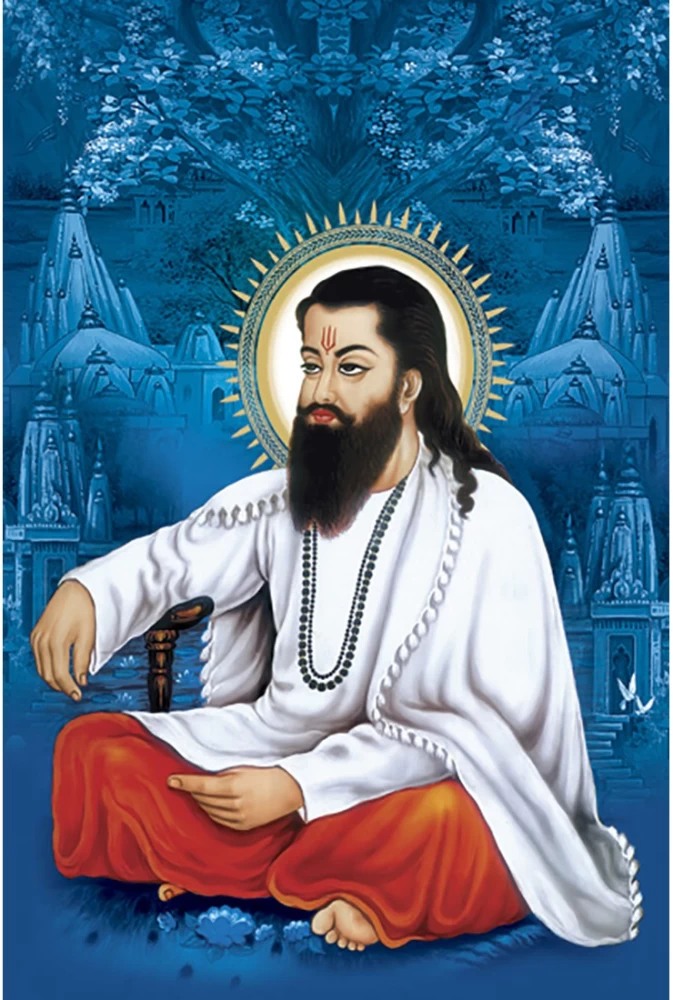Saint Ravidas
In the 15th to 16th centuries CE, Ravidas, also spelt Raidas, was a well-known Indian mystic poet-saint of the Bhakti movement. As a guru, poet, social reformer, and spiritual leader, he is highly regarded. His poetry and teachings place a strong emphasis on the abolition of caste and gender-based social barriers as well as the encouragement of cooperation in the quest for individual spiritual emancipation.
Historical Background
Scholars disagree on the specifics of Ravidas’ life. His birth and death dates are subject to dispute; some say he was born in 1377 CE and passed away in 1528 CE, while others indicate other times, such as 1267–1335 CE.
He was born to parents from the untouchable Chamar clan, who were leather workers, in the village of Sir Gobardhanpur, close to Varanasi (now in the Indian state of Uttar Pradesh). While working as a leather worker and coming from modest beginnings, Ravidas committed his life to spirituality and became well-known for his devotional verses. He made a lot of trips, stopping at holy places and connecting with different spiritual groups.
Works
Themes of adoration for the holy, opposition to social hierarchies, and the search for mystical inner experiences are common throughout Ravidas’ poetry. His devotional words were incorporated into the Sikh holy book Guru Granth Sahib, and the Hindu Dadu Panthi tradition was impacted by his teachings. He is thought to be a key player in the Ravidassia religious movement.
Themes of devotion, the nature of the divine (Nirguna-Saguna), and social equality are central to Ravidas’ philosophy. In-depth spiritual experiences and a rejection of conventional social hierarchies are both reflected in his literature. His influence on the Bhakti movement and his teachings on spiritual freedom and social equality continue to inspire people even today, despite differing opinions about his opinions and the historical veracity of his hagiographies.
Some of his well-known compositions and hymns are listed below:
- Guru Granth Sahib: The Guru Granth Sahib, the sacred text of Sikhism, has several devotional hymns written by Ravidas. His teachings on devotion, equality, and the nature of the divine are reflected in these hymns, which are scatted throughout the Bible.
- Amritbani Guru Ravidass Ji: The Ravidassia religious group, which first appeared in the 21st century, put together this collection of hymns by Ravidas. The hymns in this collection are adored by Ravidas’ followers and are said to be directly attributable to him
- anantadas Parcai: One of the oldest biographies of many Bhakti movement poets, including Ravidas, is found in Anantadas Parcai. Despite being published several centuries after him, it offers insights into his life and teachings.
- Panch Vani: The Dadu Panthi tradition of Hinduism’s Panch Vani book also contains poems by Ravidas. Many of the poetry in this collection of verses are attributed to Ravidas
- Different Devotional Verses: Ravidas’ devotional poetry addresses a variety of subjects, such as adoration of God, rejection of social hierarchies, and the search for spiritual truth. His examination of the nature of the divine is evident in the fact that many of his verses centre on the idea of the divine as being both formless (Nirguna) and endowed with characteristics (Saguna).
It’s crucial to remember that Ravidas’s influence also lives on in oral traditions, folk melodies, and local literature even though some of his works are found in canonical texts. His teachings have persisted in inspiring people from many cultures and backgrounds across time and have been passed down through a variety of sources.
Legacy
His legacy is nuanced and encompasses a range of viewpoints. The 21st century saw the emergence of the Ravidassia religion, a distinct religious movement that only emphasizes Ravidas’s writings and teachings. This movement places a strong emphasis on the community’s distinctive character and its spiritual journey. However, Ravidas’ poetry has found a place in Sikhism, a religion in which he is regarded as a spiritual leader and numerous of his poems are included in Sikh scripture.
Recently Prime Minister Narendra Modi said marginalized groups of society were the biggest beneficiaries of his administration’s policies as he laid the cornerstone for a temple in Sagar, Madhya Pradesh, honouring Sant Ravidas, a 14th-century poet and social reformer revered by the Scheduled Castes (SC) in north and central India.





